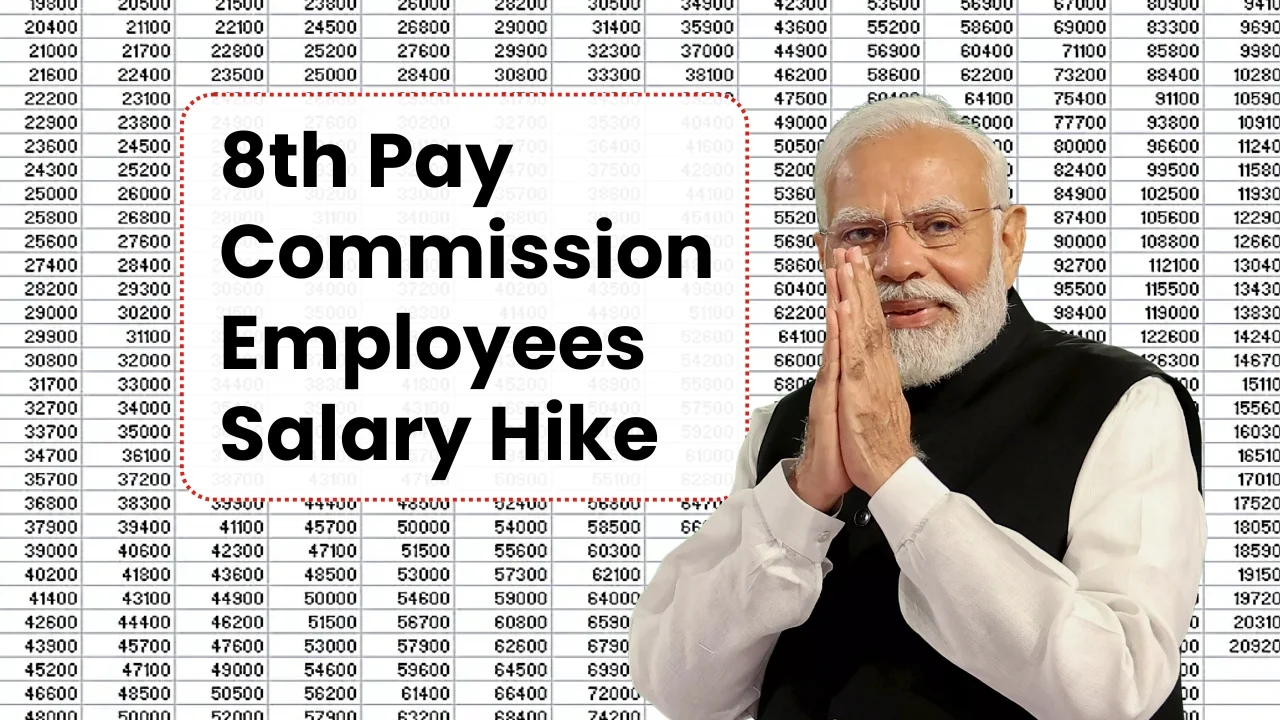India’s central government employees have a reason to celebrate, as the highly anticipated 8th Pay Commission is finally moving forward. With over one crore employees and pensioners waiting in the wings, the announcement has ignited discussions nationwide—particularly because the new commission could bring the biggest salary hike in decades. In this post, we’ll break down everything you need to know about the 8th Pay Commission employees salary hike, how much more you could earn, and what to expect in 2025.
What Is the 8th Pay Commission?
The Pay Commission is a body set up by the Government of India to revise salary structures for central government employees. The 8th Pay Commission is the successor to the 7th Pay Commission (implemented in 2016) and is designed to assess salary scales, pensions, allowances, and more. The commission considers factors like inflation, cost of living, and overall economic growth to make its recommendations.
The 8th Pay Commission is expected to be implemented by January 2026, but early indicators suggest it will include recommendations as early as 2025.
Why the Hype Around the 8th Pay Commission Employees Salary Hike?
The buzz around the 8th Pay Commission employees salary hike stems from two key developments:
- Dearness Allowance (DA) Crosses 50%: As of the latest announcement, DA has been hiked by 2%, taking it to 55%. This is a significant indicator for launching a new pay commission, as such levels of inflation usually trigger a structural revision.
- Huge Potential Pay Increase: If projections are accurate, the minimum basic pay could jump from ₹18,000 to over ₹71,703. That’s a potential hike of nearly 300% in basic salary alone.
Fitment Factor: The Game Changer
The fitment factor is the multiplier used to calculate the new pay based on current basic salaries. It was 2.57 in the 7th Pay Commission. According to reports, the 8th Pay Commission might raise this to a range between 2.86 and 3.5.
Let’s break it down:
- Current basic pay: ₹18,000
- With 55% DA: ₹27,900
- New salary estimate (fitment factor 2.57): ₹46,203
- New salary estimate (fitment factor 2.86): ₹51,795
- New salary estimate (fitment factor 3.0 or more): ₹54,000 to ₹63,000+
This could mean a monthly salary boost of ₹25,000 to ₹40,000 for entry-level government employees—and even more for higher grades.
Also Read: EPFO Pension Hike 2025: Shocking ₹7,500 Boost Announced—Is Your Pension About to Skyrocket?
How Does the DA Merger Affect Salary?
Another major talking point is the potential merger of Dearness Allowance into basic pay. Historically, whenever DA crosses the 50% threshold, it is merged into the basic pay before the next pay matrix is implemented. If this happens before the 8th Pay Commission’s recommendations take effect, employees could see:
- Higher base for future DA increments.
- Revised House Rent Allowance (HRA), Travel Allowance (TA), and other benefits calculated on a larger base pay.
This move could significantly improve net take-home pay across the board.
Salary Growth Compared to Previous Commissions
| Pay Commission | Implementation Year | Fitment Factor | Salary Hike (%) |
|---|---|---|---|
| 6th | 2006 | 1.86 | 40% |
| 7th | 2016 | 2.57 | 23–25% |
| 8th (expected) | 2026 (proposed) | 2.86–3.5 | 40–80%+ |
According to labor union leaders, the proposed hike in the 8th Pay Commission may surpass even the 6th Pay Commission in terms of percentage increase.
Pensioners to Benefit Too
It’s not just current employees who will benefit. The 8th Pay Commission is expected to revise pension structures as well. This includes:
- Increase in base pension for retirees
- Revised commutation rates
- Adjustment of DA and gratuity for pensioners
This move could provide much-needed relief for senior citizens grappling with rising living costs.
Also Read: Shocking New RBI CIBIL Score Rule 2025: Borrowers Beware or Rejoice?
When Will the 8th Pay Commission Be Implemented?
While the announcement came in early 2025, the actual panel is yet to be formed. However, here’s a tentative timeline based on previous cycles:
- Panel Formation: Expected by late 2025
- Draft Recommendations: Mid-2026
- Implementation Date: January 1, 2026 (retrospective payment likely)
Still, if inflation trends continue, the government could accelerate the process to ease financial stress on its employees.
What Employees Should Watch For
- Official Panel Notification: Once formed, the panel will begin consultations with staff associations and unions.
- Performance-Linked Pay: There’s buzz that this commission may introduce incentives for productivity, adding variable components to basic pay.
- Minimum Pay Demands: Employees unions are demanding a minimum pay of ₹26,000–₹27,000, while economists suggest the hike could go much higher.
Expert Take
According to Krishnendu Chatterjee of TeamLease, “We could see a fitment factor close to 2.8–3.0, which would push basic salaries into the ₹40,000–₹45,000 range for many employees.” Rohitaashv Sinha from King Stubb & Kasiva adds, “If inflation trends continue and DA is merged before implementation, the new minimum salary could jump as high as ₹71,703.”
What This Means for You
Whether you’re a Group C employee or working in higher grades, this pay commission could reshape your financial future. Here’s how:
- Higher Savings: With a bump in salary and potential increases in pensions, your monthly surplus could grow.
- Better Home Loans & Credit Access: Higher salary slabs mean increased eligibility for loans and EMIs.
- Boost in Retirement Planning: Government contributions to PF and gratuity will also increase, securing your post-retirement life.
Also Read: EPF Withdrawal Rules 2025: You Won’t Believe What’s Changed for Employees!
Final Thoughts
The 8th Pay Commission employees salary hike is not just a routine update—it’s a once-in-a-decade transformation of how the government compensates its workforce. With inflation climbing and DA already crossing 55%, the government’s timing couldn’t be better. As we await the formal panel formation, central employees and pensioners can start preparing for a financial windfall in 2026.
So, if you’re a government employee, stay tuned. Your salary slip might just surprise you next year.
